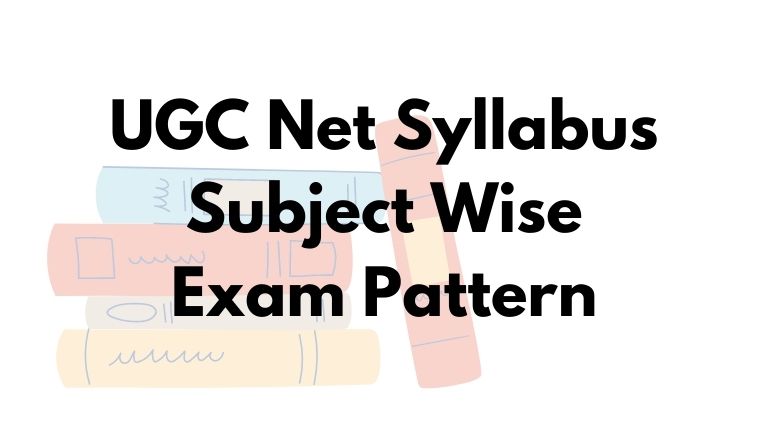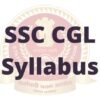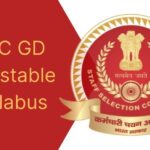UGC NET Syllabus 2022: We have provided a detailed UGC NET syllabus and exam pattern. Students should be prepared and updated. For their registered subjects. We are providing the full details of the UGC NET Syllabus. & also, Exam Pattern for your consideration. So, let’s see the details of pattern I and Pattern II.
The National Testing Agency revised the UGC NET Syllabus in 2019. and in this article, we have covered the revised topics only. UGC NET Exam consists of two papers (Paper-I and Paper-II) composed of multiple-choice questions (MCQs), and all questions are compulsory. Candidates must complete both Papers in a single duration of three hours. To achieve fine marks in the exam, read the detailed syllabus and prepare now.
UGC NET Exam Pattern 2022
Will execute UGC NET 2022 Examination online (Computer Based Test). Before reading the detailed syllabus of the Syllabus 2022, the student must be aware of the updated Exam Pattern 2022, which is below.
- The NET exam consists of two papers, Paper 1 and 2.
- All the questions in Paper 1 and 2 will be multiple-choice.
- I will give a total of 150 questions in the exam.
- Candidates have 3 hours to complete this exam.
- There will be no negative marking of any kind on the UGC exam.
- In Paper 1, you will come with questions from common subjects.
- In Paper 2, you will have questions from 81 topics you chose.
| Paper | Pattern of Paper | Number of Questions | Marks | Duration |
| Paper-I | The questions will be generic in nature, intending to assess the teaching/research aptitude of the candidate. | 50 | 100 | 03 hours (180 minutes) |
| Paper-II | This is based on the subject selected by the candidate and will assess domain knowledge. | 100 | 200 | |
| Total | 150 | 300 | ||
Important Points:
1. For each correct answer, the candidate will get two marks in Paper 1 & 2.
2. There is no negative marking for incorrect answers in UGC NEET 2022 exam.
3. Will give no marks for questions Unanswered/Marked for Review.
4. All questions are mandatory.
5. If a question is noticed as incorrect/ambiguous during a critical challenge, the candidate who has attempted the question and chosen will give one of the correct answer credits. If any dropped question(s) are settled, we will grant marks to all the candidates.
| Paper-1 | |||
| Sr. No. | Subject: | Total Ques | Total Marks |
| 1. | General Aptitude | 50 | 100 |
| 2. | Subject: Selected by Candidates | 100 | 200 |
| Total | – | 150 | 300 |
| Paper-2 | ||||
| SL. No. | Subjects | Total Ques | Total Marks | Time Duration |
| 1. | Teaching Aptitude | 05 | 10 | 3 Hours |
| 2. | Reading Comprehension | 05 | 10 | |
| 3. | Reasoning | 05 | 10 | |
| 4. | Data Interpretation | 05 | 10 | |
| 5. | People & Environment | 05 | 10 | |
| 6. | Higher Education System: Governance, Polity & Administration | 05 | 10 | |
| 7. | Information & Communication Technology (ICT) | 05 | 10 | |
| 8. | Logical Reasoning | 05 | 10 | |
| 9. | Communication | 05 | 10 | |
| 10. | Research Aptitude | 05 | 10 | |
| Total | 50 | 100 | ||
Syllabus Overview 2022
The first step to getting UGC NET ready is to follow the syllabus regularly. Such as this helps the aspirants strategize their preparations in a well-defined manner. UGC NET 2022 exam will consist of 2 papers (Paper 1 & 2). UGC NET Paper 1 will be a standard paper for all candidates, while Paper 2 will be based on the subject selected by the candidate. Please see the detailed UGC NET Syllabus for UGC NET 2022 Exam.
| Authority name | The National Testing Agency [NTA] |
| Exam name | National Eligibility Test [NET] |
| Application started on | May 2022 (Tentative) |
| Last date to apply | May 2022 (tentative) |
| Exam name | June 2022 (Expected) |
| Syllabus mode | Online |
| Syllabus date | Release date |
| Website | ugcnet.nta.nic.in |
UGC NET Syllabus for Paper 1
For Paper 1, the syllabus consists of many subjects. This will help analyze the candidate’s teaching and research abilities, cognitive abilities. And general awareness of teaching and learning processes in the higher education system. The detailed syllabus and Paper-1 details Syllabus are below:
Unit I: Teaching Aptitude Syllabus
Teaching: Levels of teaching (Memory, Understanding, and Reflective), Concepts, Objectives, Characteristics, and basic requirements.
Learner’s characteristics: Individual differences, Characteristics of adolescent and adult learners (Academic, Social, Emotional and Cognitive).
Factors affecting teaching related to Support material, Teacher, Learner, Instructional facilities, Learning environment, and Institution.
Methods of teaching in Institutions of Higher Learning: Teacher-centered vs. Learner-centred approaches; offline vs. online forms.
Teaching Support System: Modern and ICT based,Traditional
Evaluation Systems: Elements and Types of evaluation, Evaluation in Choice Based Credit System in Higher education, Computer-based testing, Innovations in Evaluation Systems.
Unit II: Research Aptitude Syllabus
Research: Meaning, Types, and Characteristics, Positivism and Postpositivistic approach to research.
Methods of Research: Experimental, Descriptive, Historical, Qualitative and Quantitative Methods, Steps of Research.
Thesis and Article writing: Format and style of referencing.
Application of ICT in research.
Research ethics.
Unit III Comprehension Syllabus
A passage of text is given. Questions are asked from the passage to be answered.
Unit IV: Communication
Communication: Meaning, types and characteristics of communication.
Effective communication: Verbal and Non-verbal, Inter-Cultural and group communications, Classroom communication.Barriers to effective communication.Mass-Media and Society.
Unit-V: Mathematical Reasoning and Aptitude Syllabus
Types of reasoning. Number series, Letter series, Codes and Relationships.Mathematical Aptitude (Fraction, Time & Distance, Ratio, Proportion and Percentage, Profit and Loss, Interest and Discounting, Averages etc.).
Unit VI: Logical Reasoning Syllabus
Understanding the structure of arguments:
- Argument forms
- The structure of categorical propositions
- Mood and Figure
- Formal and Informal Fallacies
- Uses of language
- Connotations and denotations of terms
- Classical square of opposition.
Evaluating and distinguishing deductive and inductive reasoning.
Analogies.
Venn diagram: Simple and multiple uses to establish the validity of arguments.
Indian Logic: Means of knowledge.
Pramanas: Pratyaksha (Perception), Anumana (Inference), Upamana (Comparison), Shabda (Verbal testimony), Arthapatti (Implication) and Anupalabddhi (Non-apprehension).
Unit-VII: Data Interpretation Syllabus
- Sources
- Acquisition and classification of Data.
- Quantitative and Qualitative Data.
- Graphical representation (Bar-chart, Histograms, Pie-chart, Table-chart and Line-chart) and mapping of Data.
- Data Interpretation.
- Data and Governance.
Unit-VIII Information and Communication Technology (ICT)
- General Abbreviations and Terminology, Basics of the Internet, Intranet, E-mail, Audio and Video-conferencing, Digital initiatives in Higher Education, ICT and Governance.
Unit-IX People, Development and Environment
- Development and Environment: Millennium Development and Sustainable Development Goals.
- Human and Environmental Interaction: Anthropogenic activities and their impacts on the environment.
- Environmental Issues: Local, Regional and Global issues; Air Pollution, Water Pollution, Soil Pollution, Noise Pollution, Waste (Solid, Liquid, Biomedical, Hazardous, Electronic), Climate Change, and its Socio-Economic and Political Dimensions, Impacts of Pollutants on Human Health.
- Natural and Energy Resources: Solar, Wind, Soil, Hydro, Geothermal, Biomass, Nuclear, and Forests.
Unit-X Higher Education System
- Institutions of Higher Learning and Education in Ancient India.
- Evolution of Higher Learning and Research in Post-Independent India.
- Oriental, Conventional, and Non-Conventional Learning Programs in India.
- Professional, Technical, and Skill-Based Education.
- Value Education and Environmental Education.
- Policies, Governance, and Administration.
UGC NET Paper 2 Syllabus 2022
The candidate chooses the subject for paper 2. Paper 2 will have 100 questions exclusively based on the topic chosen. The detailed syllabus PDF for 81 issues of the UGC NET Exam is below. Candidates must also refer to the topper’s preparation strategy to give their best and ace the UGC NET exam.
UGC NET Marking Scheme 2022
- The uniform marking scheme is in the exam, i.e., for both Paper 1 and 2, each correct answer is worth two marks.
- As per the revised UGC NET exam, there is no negative marking for an incorrect answer.
- Hence, rather than missing a question, one can use their calculated guess and mark the answer.
The updated marking scheme for UGC NET is below:
| Type of Answer | Marks Allotted |
|---|---|
| Correct Answer | 2 marks |
| Incorrect Answer | 0 mark |
| No Answer | 0 mark |
From the above table, we comprehend that the students will not face any deduction in marks in case of wrong answers. However, the students will not get any score for unanswered questions or ‘Marked for Review’ questions. Also, if a question is seen to be incorrect, what will give the benefit of marks to only those candidates who attempted the question? However, if NTA drops a question, which will provide help to all the candidates.
| Read Also: SSC CGL Syllabus 2021 and Exam Pattern with PDF |
Frequently Asked Questions on UGC NET Syllabus
1.) Is UGC NET a Tough Exam?
Answer: Yes, the exam is tough, however, many candidates (who have worked hard for it) try hard to make it to the cut off of UGC NET. UGC NET exam consists of 2 papers – Paper I and Paper II. Paper I is the general aptitude test, which is conducted to analyze the teaching and research potential of the candidates.
2.) Can I become a lecturer without NET?
Answer: Yes, it is mandatory if you want to become an Assistant Professor/Lecturer all over India. As per UGC rules, only UGC NET exam is the gateway or the first stage to become an assistant professor. PhD candidates are not exempt from appearing at UGC NET.




Pingback: KVPY Syllabus 2022 for SA, SB and SX Streams (Updated) | ExamCurve
Pingback: JPSC Syllabus with Its Exam Pattern: 2022 | ExamCurve
Pingback: CLAT Syllabus Details with Exam Pattern 2022 | ExamCurve